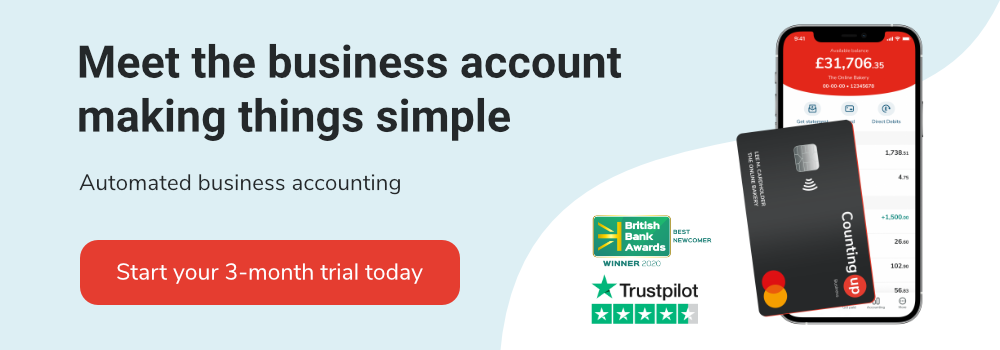How to organise small business finances
Table of Contents
Managing your small business finances well can ensure your success as an entrepreneur, while poorly organised finances can create a lot of chaos and confusion. That’s why a clear strategy to manage your cash flow is so important. By making a few changes to the way you take care of your money, you can get a better overview of your income and expenses and ensure you stay on top of your finances.
Let’s explore some of the following tips on how to stay on track with your business finances:
- Separate personal and business finances
- Track your income and expenses
- Create an invoicing system
- Budget for taxes
- Take advantage of technology
Separate business and personal finances
The easiest way to better handle your income and expenses is to open a business bank account or just a separate personal bank account that you only use for business purposes. When all your business expenses and income are recorded in one account, it’s easier to organise the data when tax time comes.
If you haven’t opened a business bank account yet, don’t put it off any longer. Not having to dig through your personal bank account to separate personal and business transactions manually will make your life so much easier.
Make sure to use your business account only for business-related expenses. Find out more about why you need to separate business from your personal expenses here.
Track your income and expenses
Tracking your income and expenses is essential when it comes to organising your finances. Categorising your expenses can help you save money because controlling your expenses is easier when you clearly understand where your money is spent.
You can probably deduct some of your business costs from your taxable income, so it’s essential to keep an accurate record of your income and expenses to make your tax return easier to complete.
Tracking your income is important because it helps you provide correct information on your tax return and pay the right amount of tax. Submitting truthful and accurate tax information is the best way to avoid a tax audit. But if you do ever get audited, HMRC might ask to see your income and expense accounts, which is another good reason to keep your records organised.
Create an invoicing system
If you invoice your customers, an effective system for sending and tracking invoices can be beneficial for tracking your income. It can help you keep an eye on expected income and unpaid invoices. See our guide on how to create invoices for sole traders to learn more about invoicing.
Offering multiple payment options and setting clear invoice payment terms could encourage your customers to pay you on time, helping to avoid cash flow interruptions. A standard option is to give your customers 30 days after the invoice date to pay their bills. You can change the number of days to suit your business or offer incentives for paying early.
The app lets you send invoices digitally and monitor the payments as they come in. For example, when you use Countingup, you can generate invoices in seconds and accept payments directly into your business account. Plus, the app can number and match your invoices for better organisation.
Countingup also sends your notifications when clients pay your invoices. Automatic invoice notifications save you from checking if an invoice has come through. This way, you can keep better track of your money. Learn more about invoicing with the Countingup here.
Budget for taxes
You probably have a budget for different types of expenses in your business. But a hefty tax bill at the end of the year can take you by surprise if you haven’t been tracking your income and expenses throughout the year.
When you consistently track your income and expenses, you can easily estimate how much tax you might have to pay each tax year. Countingup will even give you a year-round tax estimate to help you avoid surprises. You can learn more about what tax businesses and sole traders pay here.
Regular Self Assessment Tax payments can also be made in portions, so you can save for your tax bill throughout the year and not have to fork out a large sum in one go. By setting money aside each month, you ensure that you have the funds ready to pay your tax bill when the time comes.
Take advantage of technology
Some of your daily bookkeeping tasks can be easily automated, which could save you a lot of time. Countingup’s two in one business account and accounting app keep all your data in one place, so it’s easier to keep track of.
Countingup can instantly categorise expenses, track income, and give you tax estimates to help you budget for your expenses and tax bill. You can also easily create and send invoices and track unpaid invoices.
Automating some of your everyday bookkeeping can help you stay organised and save time, not to mention how much easier it could make to manage your finances.
Confidently manage business finances with a simple app
Thousands of business owners are using the Countingup app to save time on their financial admin and focus on growing their business.
Countingup is the business current account and accounting software in one app. It automates time-consuming bookkeeping admin for self-employed people across the UK.
With automatic expense categorisation, receipt capture tools and cash flow insights, you can confidently keep on top of your business finances and save yourself hours of accounting admin, so you can focus on doing what you do best.
Find out more here.
Receive actionable business tips weekly
By submitting this form, you confirm that you are 16 years of age or over and that you have read and agree to our Privacy Policy. You can unsubscribe at any time.




